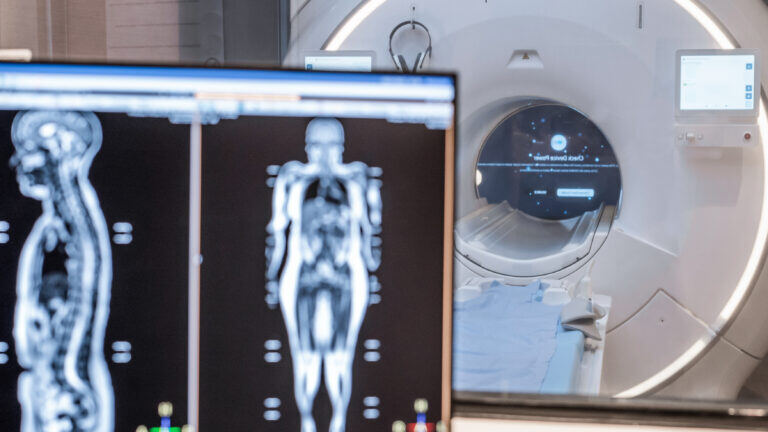Research
In search of proof that body scans are worth it

The idea is so incredibly seductive, it's no wonder it caught on: With a $1000 whole-body scan, Prenuvo says it can catch signs of brewing health problems, diagnose the elusive cause of some discomfort, or better yet, tell you that everything's fine and you can go about your life as you were. The company raised $70 million in 2022 to chase this dream.
But critics, of Penuvo and other services like it, argue there's no evidence to suggest that the discoveries made by their preventative MRI scans actually lead to better health outcomes. They're an indulgence of the wealthy and worried that may suck up limited health care resources, lead to unnecessary care, and potentially, lead to negative outcomes, like infections from elective surgery.
Prenuvo, which is all about being proactive, has decided not to take this criticism lying down and announced it will launch a 10-year, 100,000 person study of its technology "to assess diagnostic and clinical outcomes." The company told STAT's Mohana Ravindranath that the study aims to enroll the general population, including low-income patients in the Boston area whose tests will be subsidized.
Read more on Prenuvo's plan to silence the naysayers here
Artificial intelligence
CHAI speaks up on criticisms
The Coalition for Health AI, or CHAI, is a non-profit, backed by some of the biggest technology companies in the world, that has thrust itself into the center of the debate over regulation of artificial intelligence tools and, more broadly, what makes AI trustworthy for use in health care. This has lead to concerns that the organization will shape rules that favor big technology companies. The organization this week released a draft of its Responsible Health AI Framework. STAT's Nicholas St. Fleur caught up with CEO Brian Anderson and asked him about some of the recent criticisms.
Anderson said that smaller startups are "equally important" as the large organizations that participate in CHAI.
"We are not an organization that is run by Big Tech," he added. "Let me repeat that again: We are not an organization that is run by Big Tech."
Read Nick's extensive interview with Anderson and decide for yourself.
Medicare Hospital at home creeps towards commercial
New Jersey-based Hackensack Meridian Health this week announced it will gradually expand its hospital at home program from three of its larger facilitates, to its entire system of 18 hospitals, illustrating growing momentum behind home-based care in the wake of the pandemic.
Importantly, Hackensack Meridian said it's treating patients on commercial insurance in addition to those on Medicare. The expansion comes as Congress has yet to make permanent the flexibility that enabled hospital at home to flourish.
To refresh: In 2020, Medicare officials launched a waiver program that allowed approved hospitals to deliver inpatient care in people's homes with rigorous requirements. Early studies of thousands of patients in hundreds of hospital-at-home programs launched under the program suggest they deliver equivalent care to traditional hospitalization. Importantly, patients are often rapturous about the benefits of sleeping in their own beds.
Hackensack Meridian's program, which it calls Hospital From Home, currently has capacity for about 10 patients per day. In a recent eight-week stretch, it freed up 452 "bed days" at its brimming hospitals.
In another sign of momentum: Hackensack Meridian's president of population health Patrick Young told me that it has inked deals with two commercial payers over the last four months and that it is seeing some commercial patients in the program. "It's really just at the beginning," he said. Medicare is often seen as the gateway to broader adoption for innovative ideas and that appears to be playing out in this case as well.
Hackensack Meridian's expansion is also interesting in light of hospital at home's current status of permanent impermanence. The waiver program was, along with other pandemic flexibilities, extended for two years at the end of the official public health emergency. A five-year extension of the program is currently part of draft legislation that's going around Congress. Advocates say these temporary extensions create uncertainty that prevent hospitals from making long-term investments necessary to have meaningful impact on hospital capacity — and to realize cost savings from operating these programs at larger scale.
While Hackensack Meridian is ready to buy in now, CEO Robert Garrett told me that permanent legislation is important to make hospital at home "part and parcel of the mainstream health care system."
Proponents, like Hackensack Meridian partner Medically Home, suggest 20% to 30% of care currently delivered in a hospital setting could be delivered in people's homes. Obviously we're not there yet, but Young said Hackensack Meridian could be up to 15 patients per day by August.


No comments